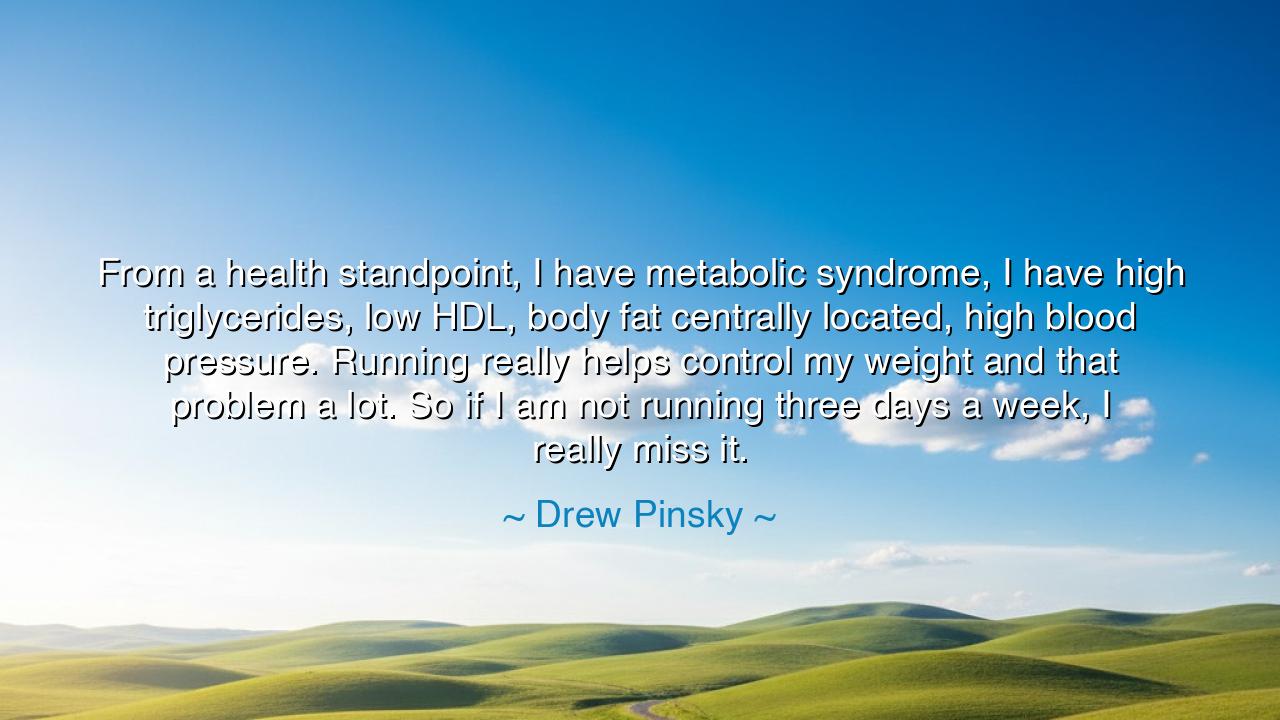
From a health standpoint, I have metabolic syndrome, I have high
From a health standpoint, I have metabolic syndrome, I have high triglycerides, low HDL, body fat centrally located, high blood pressure. Running really helps control my weight and that problem a lot. So if I am not running three days a week, I really miss it.






“From a health standpoint, I have metabolic syndrome, I have high triglycerides, low HDL, body fat centrally located, high blood pressure. Running really helps control my weight and that problem a lot. So if I am not running three days a week, I really miss it.” Thus spoke Drew Pinsky, physician, scholar, and counselor of the human condition, whose words bear both humility and truth. In this reflection, he reveals a wisdom not found in the ivory towers of theory, but in the lived experience of flesh and blood — the recognition that health is not a gift granted once, but a discipline renewed each day. His words remind us that the human body, like the spirit, demands balance, motion, and vigilance, and that through such care, even weakness can become a teacher and guide.
In the ancient world, health was not merely the absence of illness but the harmony of the whole being — body, mind, and soul. The Greeks called this balance eukrasia, and they believed that the strength of a man was not measured by muscle alone, but by his ability to master his own nature. So too does Drew Pinsky embody this truth, acknowledging his metabolic challenges not as defeat, but as the call to discipline. He does not lament his condition, but transforms it into a source of purpose, a daily reminder to move, to breathe, to honor the body as the vessel of life’s spirit. For him, running is not vanity, nor punishment — it is communion with vitality itself, a ritual of alignment between the mortal and the eternal.
Metabolic syndrome — the collection of ailments he names — is a mirror held up to the modern world. It speaks of abundance without moderation, of comfort without balance, of a society that has forgotten the ancient wisdom of movement. Where once men walked fields and climbed hills, now they sit before screens; where once labor was life, now leisure is disease. Yet Pinsky, though a man of science, speaks with the insight of the ancients: that the remedy for such imbalance lies not in pills alone, but in discipline and will. To run is to remember — to awaken the forgotten bond between motion and meaning, between sweat and salvation.
Consider the parable of Hippocrates, the father of medicine, who once said, “Walking is man’s best medicine.” He taught that the body, when active, heals itself, and that idleness invites decay. In every culture, the wise have known this truth: from the monks who meditated through movement to the warriors who trained not for battle but for inner mastery. So too does Pinsky walk — or rather, run — in their footsteps. His three days of running each week are not simply habit, but devotion. And when he says he “misses it” when absent, it is not mere nostalgia; it is the longing of the soul for its rightful rhythm. For the body, deprived of motion, grows restless; the spirit, deprived of effort, grows dull.
In his confession, there is also humility — the wisdom of one who knows that strength is not the absence of frailty, but the courage to confront it. High blood pressure, low HDL, central body fat — these are the adversaries he faces not with despair, but with perseverance. His words teach us that health is not a state of perfection, but a continuous act of self-respect. To know one’s vulnerabilities and yet refuse surrender — this is the truest form of mastery. The ancients would call this sophrosyne, the balance of body and soul that arises from moderation, awareness, and will.
There is, too, a greater lesson here: that the path to healing begins not in denial, but in acceptance and action. Pinsky does not seek to escape his condition; he works with it, learning its language, obeying its boundaries, and pushing gently against them. His life becomes a metaphor for all who struggle — for those burdened not only by illness of the flesh, but by weariness of the heart. The act of running, repeated week after week, becomes a form of prayer — each step a declaration that life, though imperfect, is still sacred and worth the effort to sustain.
So let this be the teaching drawn from his words: honor your body as you would honor a temple, not through indulgence, but through care. Let motion be your medicine, and discipline your daily offering. Do not wait for illness to teach you the value of health — cherish it now, with gratitude and awareness. The modern world may offer abundance, but abundance without balance is decay. Seek instead the wisdom of effort, for it is through struggle that peace is found.
Thus remember the words of Drew Pinsky, and let them echo within your spirit: “Running really helps control my weight and that problem a lot. So if I am not running three days a week, I really miss it.” In this confession lies not mere habit, but truth — that vitality is earned through devotion, that health is the fruit of mindful labor, and that the soul, like the body, finds its freedom not in ease, but in movement. Therefore, rise each day, take to the path, and let your steps become the song of your own endurance — for to care for your body is to honor the divine spark that lives within it.






AAdministratorAdministrator
Welcome, honored guests. Please leave a comment, we will respond soon